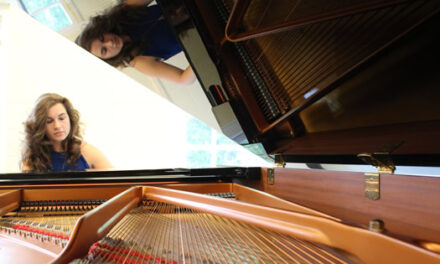The ArtsCenter‘s 10 By 10 in the Triangle opened Friday night in Carrboro for its 14th consecutive year. This tradition celebrates the increasingly popular ten-minute play genre, utilizing ten playwrights, ten directors, and ten actors. According to Artistic Director Jeri Lynn Schulke, from January to May, over 550 scripts from all over the world were submitted to the festival. Schulke hopes this year’s theme of “an eye on societal issues” results in a production that is “fresh, current, challenging, thought-provoking, and rewarding.” Although some of the plays were much more enjoyable than others, the talent with which they were directed and depicted further prove 10 x 10 in the Triangle to be a jewel in the Triangle’s arts cap. (Please do take note that the content is not suitable for all children.)
The first half of the production was expertly directed, acted, and staged, even though the first five plays were all very different. Catherine Castellani’s “Work” takes place in a corporate workplace and juxtaposes employees’ competitive spirits with their animal instincts to escape and inner desires to be true to their own life goals. Julie Oliver was especially entertaining as “Mary,” a temp-turned-assistant — her real name is Jennifer, but she replaced an assistant named Mary and assumes the title as well as the name.
Similarly comedic is Dan Borengasser’s “The Third Person,” which shows what it might be like to have a not-quite-omniscient narrator suddenly take interest in the resolution of the life he narrates. Leigha Vilen plays a woman trying to have a serious moment when the narrator (Fred Corlett) keeps describing her and for the first time she hears him.
Third comes Rich Espey’s “Ablan’s Garden,” a much more sobering scene depicting two women stuck at opposite ends of a neighborhood crisis. The women are trying to recover from a tragedy in their own ways and take care of their own children, but mistrust and a lack of understanding thrusts them apart.
Similarly, “Broken” by James McLindon takes place in a setting where trust can be the most dangerous tactic. In a dystopian world where political prisoners are questioned and forced to act as informants on others, two prisoners are thrust apart — or perhaps together? — as they try to determine the best courses of action for their own safety. I commend actors Alexander Jackson and Shaun Schneider for their convincing portrayals of these strangers forced to become so quickly intimate.
The fifth and final play of the first act, “As We Knew It” by L. Robert Westeen, was easily the most powerful of the night. Five characters from four terrible historical events share their stories: of ancient Jericho’s fall, of the Holocaust, of the 1980’s HIV-AIDS crisis, and of the 9/11 attacks in New York City. While these are all terrifying events in themselves, these characters explain their perspectives and how they attempted to understand, if not accept, their fates.
After intermission were several more comedies to lighten the mood after Westeen’s bombshell of a script. Jack Karp’s “Brother, Can You Spare A Dime?” is a modern take on the silent movie phenomenon of the 1920s, with stylized characters: flapper Title Card Girl, disheveled Homeless Man, devious Bank Manager, and sly Piano Man. Monet Marshall’s direction provided rollicking laughter — and even audience participation — throughout the theater, and the choices in anachronistic musical references were delicious.
Matt Crowley’s “Couples Therapy” somehow managed to be even more hilarious. Fred Corlett and Julie Oliver played a husband and wife bickering endlessly during a “shortcut to the pharmacy” that reveals itself to be a murder scheme by the husband. Unfortunately, his wife sees right through it and immediately starts belittling him, claiming he can’t even properly plan a murder!
When a black man is stopped by a white police officer late on the street, an abrupt shift in tone came to the forefront. Rich Rubin’s “Stop/Frisk” brings to life the issues argued during the Ferguson protests, including police brutality, stereotyping, profiling, and arbitrary arrests. Unfortunately, the script refused to bring much clarity or insight to either side of the issues at stake, and ended up portraying a meandering scene that was somehow neither serious nor satire and thus somewhat upsetting. Actors John Allore and Alexander Jackson did a fine job in their roles as police officer and suspect, respectively, who traverse the areas between good and evil, friend and stranger, ally and enemy.
Another of the most powerful plays of the night pits two mothers against each other, again on opposite sides of a crisis. Allan Bates’ “Two Mothers at a Roadside Cafe” opens with the titled mothers meeting under unknown circumstances and attempting to begin conversation about an unknown tragedy for which one mother (unjustly) blames the other. While both mothers have the right to be angry and resentful, they try to reach some common ground in a realistic — awkward and painful — conversation at a cafe. Page Purgar and Barbette Hunter are highly talented actors that gave visceral performances opposite the ever-grounding and continuing backdrop of everyday life, represented in Kala Hinnant’s portrayal of the waitress, which provided just enough levity to keep the scene going.
Finally, “After You” by Daria Miyeko Marinelli shows an everyday encounter between a couple who finds their relationship too complicated to continue. The director’s use of the backdrop to show text message conversation between the main characters as they explore the course of their newly separate lives is as effective as the stage that is split into two simultaneous yet distant settings. The ever-shifting dynamic between the man and woman shows how “complicated” relationships can truly be. Although I might have ended with a less anticlimactic play, it was a good end to an overall good night.
10 By 10 in the Triangle continues through Sunday, July 26. For more details on this production, please view the sidebar.












